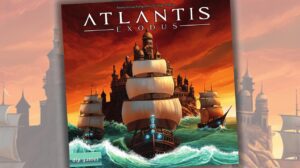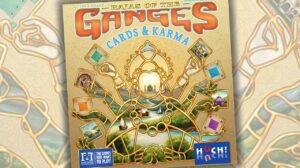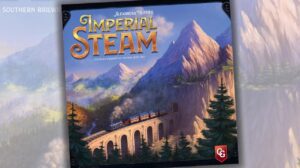Thrones of Valeria – Justin Bell
I think Valeria Card Kingdoms is the best of the “roll dice, get stuff” games in the realm of Machi Koro and Space Base, so anything in the world of Valeria has my full attention.
Thrones of Valeria has nothing to do with the base game—there’s not a die in sight—but this quick 20-minute card game does so much with so little. Over two quick rounds, players use their hand of cards to manipulate an ever-changing trump suit market, steal coins from other players, and even assassinate a suit to try and swap the value of a suit to move ahead in a single trick.
Thrones of Valeria is so chaotic that you don’t even count the number of tricks you have won, because all that matters is how much money you collect during play. A very easy game to pick up with a solid player aid, with lots of interaction and a process that does not overstay its welcome. My colleague Andrew Lynch reviewed a prototype version of the game last year.
Ease of entry?:
★★★★☆ – The odd bump or two
Would I play it again?:
★★★★☆ – Would like to play it again
Read more articles from Justin Bell.
On the Origin of Species – David McMillan
Origin follows the exploits of Charles Darwin and the HMS Beagle during its voyage through the Galapagos Islands in 1831. Mechanically, it’s a very simple game. Each tile in the game represents a different type of species and includes one or more icons. Each undiscovered species has a cost, some collection of different icons. On a player’s turn, they have one of two options: place some cubes on the tiles—giving them access to those icons—or use previously placed cubes to discover new species of flora and fauna. Discovering new things earns you points, access to more varied collections of icons, and even cards which will assist you during your voyage (and may even score you more points).
I enjoyed my first playthrough of this game and I look forward to many more. It was very easy to learn and it played quickly enough that my wife and I were able to knock out most of a game during one of our four-year old’s nap times.
Ease of entry?:
★★★★★ – No sweat
Would I play it again?:
★★★★☆ – Would like to play it again
Read more articles from David McMillan.
AEOLOS – Tom Franklin
You start the game by setting your ships off to the different islands on the board to take actions and collect gems; you’ll end the game by sending those same ships down the rivers to point-scoring Temples. Movement is based on the total of the card you play and another card already on the board.
For me, there wasn’t anything all that new about this game other than the card-based movement mechanic. This one just wasn’t for me.
Ease of entry?:
★★★☆☆ – There were a few questions
Would I play it again?:
★★☆☆☆ – Would play again but would rather play something else
Read more articles by Tom Franklin.
Everdell: Newleaf – Bob Pazehoski, Jr.
Everdell is singularly responsible for shoving me into the deep end of the tabletop hobby, so I enter every new iteration with hesitant glee. Newleaf brings a bit of locomotive energy to the scenery, exploding the deck by almost 60 cards and several modular expansions. Because an extension to the Meadow is necessary with so many cards, I appreciate the Station. The Passengers and their endgame bonuses are a smooth addition, as are the two new locations tied to the wider board.
Our first endeavor included all of the modules for an experience that lasted about 10-15 minutes longer than our typical game. I thought it was pretty reasonable given the number of new cards we were learning along the way. I think Newleaf joins Bellfaire in the “more of the same” category of expansions, where nothing feels radically different. I appreciate the smooth transition into the new ruleset and the cards are near seamlessly integrated via the golden doors. I’m not sure I’d use every module every time, but there’s a lot to love here. Newleaf celebrates the broader world of Everdell without undermining the core personality of the game.
Ease of entry?:
★★★★★ – No sweat
Would I play it again?:
★★★★★ – Will definitely play it again
Read more articles from Bob Pazehoski, Jr.
Pletrix – Andy Matthews
During the pandemic I went on a spree of backing games on Kickstarter. Pletrix was one that caught my eye, thanks to its vibrant colors and it being a roll & write (yes Donna I have a type). I finally got my shipment this week and immediately wanted to play. It’s not often that a game winds up being cooler than you think, but that’s the case with this one; especially with the dice–they’re amazing!
Pletrix is a polyomino type game, but in roll & write form…players roll 10 colored dice (2 each in 5 different colors). The active player chooses two colors to keep, one to take out of the round, then passes the rest to the other players. Each player draws the shape on the faceup side of the die they have in an area of their player sheet matching the color they chose. Similar to Ganz schön clever, each of the 5 different areas have different scoring requirements: pink earns negative points unless you fill up every space, blue earns 1 point per filled in space, green earns points per completed row (but shapes must “fall” down from the top of that panel), yellow earns points for each star you reach, and orange earns points for each fully completed section (starting from the left).
Pletrix is easy to play, with just enough thinkiness to satisfy a discerning gamer, but not so much that casual gamers are turned off. Plus did I say how amazing those dice are?
Ease of entry?:
★★★★★ – No sweat
Would I play it again?:
★★★★★ – Will definitely play it again











